|
|
|
Sort Order |
|
|
|
Items / Page
|
|
|
|
|
|
|
| Srl | Item |
| 1 |
ID:
182149
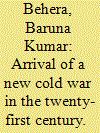

|
|
|
|
|
| Summary/Abstract |
The saying ‘History repeats itself ’ seems to be validated in the present scenario of international politics. The memory of the Cold War era is being resurrected in this twenty-first century. All these things become more visible in this pandemic period with clear-cut fault lines drawn between the USA (the surviving superpower) and China (the emerging superpower). The suspicion about the role of China in spreading the Wuhan Virus (COVID-19) has brought closer the prospect of the new cold war. Recent belligerent attitudes of China support this assessment. Cold war power politics will resurface with Asia as the focal point. The concept of Bi-polarity is taking shape again in world politics. Structures such as the D-10, G-7 extension, Quad grouping and Five Eyes networking bolster the bi-polarity. Against this background, Baruna Kumar Behera seeks to examine international politics in this century.
|
|
|
|
|
|
|
|
|
|
|
|
|
|
|
|
| 2 |
ID:
139024
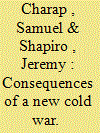

|
|
|
|
|
| Summary/Abstract |
The Ukraine crisis poses vexing policy challenges for Washington. President Barack Obama has sought to strike a balance between the imperative of responding to Russian actions and the equally important need to avoid an all-out confrontation with Moscow. As he put it in July 2014, ‘it’s not a new Cold War … [It] is a very specific issue related to Russia’s unwillingness to recognise that Ukraine can chart its own path.’ The problem is that the administration’s balancing act cannot last long. As the deterioration of conditions in Ukraine in recent weeks has demonstrated, forces beyond the president’s control are pushing him toward the very new Cold War that he wants to avoid. He will eventually face a choice between that outcome, which would be hugely dangerous and costly, and negotiations on a revised regional order in Europe, which might hurt him politically but would be far better for the United States and for the world. He should move toward the negotiated outcome now.
|
|
|
|
|
|
|
|
|
|
|
|
|
|
|
|
| 3 |
ID:
177082


|
|
|
|
|
| Summary/Abstract |
The Hong Kong crisis, which began with massive demonstrations against the Fugitive Offenders and Mutual Legal Assistance in Criminal Matters Legislation (Amendment) Bill in June 2019, has persisted over a long period. Although these demonstrations were originally organized to oppose the said bill, the government’s hardline approach to the issue made the demonstrators turn toward using increasingly intense methods of protesting. Further, the original stance of opposing the bill underwent a shift toward opposing the government, finally culminating into a full-fledged pro-democracy movement critical of the system that exists in Hong Kong. Consequently, citizens’ interest in politics increased, the sense of identity as a “Hongkonger” deepened, and even “Hong Kong nationalism” began to stir. Finally, the Trump administration, which had previously paid no attention to these developments, signed the Hong Kong Human Rights and Democracy Act into law and prepared to impose sanctions on China.
In response, in May 2020, the Chinese government declared the imposition of the Hong Kong National Security Law. On June 30, 2020, it enacted the Law of the People’s Republic of China on Safeguarding National Security in the Hong Kong Special Administrative Region and enforced it in Hong Kong. This law provides scope for widespread interference by the central government in Hong Kong’s legislative, administrative, and judicial processes, thereby weakening its autonomy. Not only did the vague wording of the law constrain Hong Kong’s citizens about their freedom being compromised, but it was also implemented as a means to suppress the pro-democracy supporters in Hong Kong. However, the Hong Kong National Security Law was strongly opposed by the international community, and the US began imposing sanctions.
Hong Kong is the front line in a “new cold war” situation between the US and China. The fact that the Hong Kong issue led to US-imposed sanctions on China symbolizes the escalation of the geopolitical “new cold war” in East Asia between these two powers. Therefore, the outcome of the Hong Kong issue could potentially determine the future of this region.
|
|
|
|
|
|
|
|
|
|
|
|
|
|
|
|
| 4 |
ID:
187417
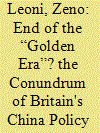

|
|
|
|
|
| Summary/Abstract |
This analysis contributes to a fast-growing body of literature on Sino-Western relations and the tension between economic and security interests. It takes Britain's China policy as a case study considering the Integrated Review 2021. It argues that London's stance towards Beijing has shifted – officially – from the so-called “golden era” to a complex phase of diplomatic–military tensions and scrutinised economic relations, principally because of US pressure. However, this shift de facto has not had a structural impact on the economic side of the relationship between London and Beijing. The article reaches this conclusion by framing its narrative through the lens of the economy-security conundrum at the heart of the Liberal International Order and through the lens of the New Cold War between the US and China. These two factors are crucial for understanding the change between Britain's China policy pre- and post-2016.
|
|
|
|
|
|
|
|
|
|
|
|
|
|
|
|
| 5 |
ID:
132698
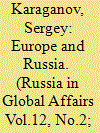

|
|
|
|
|
| Publication |
2014.
|
| Summary/Abstract |
Debates over the ongoing crisis in relations between Russia and the West revolve around the incorporation of Crimea, the global reaction to that move, and the future configuration of the Ukrainian state if, of course, it manages to survive (and I hope it will). But I contend that these are not the primary issues in global terms. There are other crucial questions. The first is what the European security system will be like. I repeat: the Old World was not allowed to withdraw from the Cold War, and now it may see a new round of tension. The second important question is whether Russia will be able to overcome the impasse in its development, in which it found itself after it restored statehood at the end of the 2000s. The third and closely linked question is whether Russia will wish to remain part - even an independent and very special partner - of Europe or will it opt for cultural-civilizational isolation and increasingly lean towards the East economically. It is obvious that Russia is firmly determined to change the rules of the game that have been dictated to it for the past twenty-five years. Unable and reluctant to toe the line, Russia has given up attempts to become part of the West.
|
|
|
|
|
|
|
|
|
|
|
|
|
|
|
|
| 6 |
ID:
138790
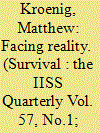

|
|
|
|
|
| Summary/Abstract |
Russia’s annexation of Crimea, invasion of Donbas, and continued threats to Ukraine and other European countries not only menace the stability of the post-Cold War order in Europe, but also pose a fundamental challenge to the assumptions about the strategic environment that have undergirded the NATO alliance for the past quarter of a century.
|
|
|
|
|
|
|
|
|
|
|
|
|
|
|
|
| 7 |
ID:
106747


|
|
|
|
|
| Publication |
2011.
|
| Summary/Abstract |
Are we witnesses to the resurrection of geopolitics in Germany? At first sight the recent emergence of a 'new Cold War' narrative on Russian energy appears as part of a wider renaissance of geopolitics. Yet, a closer look will reveal the presence of a stealthy quasi-liberal geopolitics, equally laden with spatial language that preceded the new Cold War. This article tries to unpack this earlier narrative of 'strategic partnership' that has remained popular within the German energy policy establishment. Here we encounter a story of cooperation between two former geopolitical rivals that are situated within a Europe that seeks to modernise a yet backward but adaptive East. Hence, what we could observe is not the death and rebirth of geopolitics, but merely a partial narrative transformation from one type of geopolitics to another. The article suggests that geopolitics could not have been dead, for it has always been undead.
|
|
|
|
|
|
|
|
|
|
|
|
|
|
|
|
| 8 |
ID:
138601
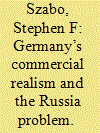

|
|
|
|
|
| Summary/Abstract |
Russia’s annexation of Crimea and its attempts to destabilise Ukraine resemble traditional geopolitics and have prompted references to a ‘new Cold War’, but this comparison overlooks the transformation in the nature of international affairs brought about by globalisation, and its implications for Berlin’s relationship with other Western capitals, as well as Moscow. We are in an era of commercial realism, and Germany is the kind of prototypical geoeconomic power that challenges the old type of military-based power embodied by the United States and Russia. Moscow’s use of, and threat to use, military force in Ukraine are only part of the opening phase in a much longer game, one in which economic interdependence will be decisive.
|
|
|
|
|
|
|
|
|
|
|
|
|
|
|
|
| 9 |
ID:
183509


|
|
|
|
|
| Summary/Abstract |
Initially Western scholars generally assumed that Russia would become a ‘normal’ democratic state, taking its place in the existing world order. They attributed this to Yeltsin's democratic credentials, but they could do so only by ignoring the clear flaws in Russian democracy as it developed under his presidency. This means that when Russia moved in a more authoritarian direction under Yeltsin’s successor Vladimir Putin, the explanation that most gave for this was the agency of Putin. He was seen as reinstating many of the elements of the Soviet legacy, including the role of the security apparatus. Putin’s rise was also seen as decisive in the shift of Russia’s international position from one seeking accommodation within the existing international architecture to one seeking to revise that architecture in ways objectionable to the West. The result is said to be a new cold war. But there is disagreement about how this should be understood: is Russia acting as a traditional great power, and therefore understandable through the established principles of international relations, or is she still claiming Soviet-style exceptionalism? What is clear, and many do not appreciate, is that even when Putin has gone, Russia’s core interests will likely not change.
|
|
|
|
|
|
|
|
|
|
|
|
|
|
|
|
| 10 |
ID:
184958
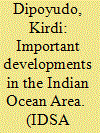

|
|
|
| 11 |
ID:
184925
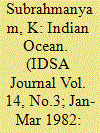

|
|
|
| 12 |
ID:
029979
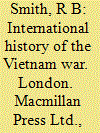

|
|
|
|
|
| Publication |
London, Macmillan Press Ltd., 1983.
|
| Description |
xiii, 301p.hbk
|
| Contents |
Vol. I: Revolution versus containment, 1955-61
|
| Standard Number |
0333242467
|
|
|
|
|
|
|
|
|
|
|
|
Copies: C:1/I:0,R:0,Q:0
Circulation
| Accession# | Call# | Current Location | Status | Policy | Location |
| 028175 | 959.7042/SMI 028175 | Main | On Shelf | General | |
|
|
|
|
| 13 |
ID:
168166


|
|
|
|
|
| Summary/Abstract |
In recent years, Chinese scholars and policy elites have discussed the ever intensifying strategic competition between the United States and China and its multifaceted implications for Chinese foreign policy. Some even worry about the possibility of a new Cold War between the United States and China. This article aims to offer an analysis of Chinese perspectives on US–China strategic competition. In the view of most Chinese observers, US–China strategic competition is inevitable because China is closing the national power gap between itself and the United States, while the latter resolutely upholds its global primacy. Other factors, including ideological disagreements, may fuel the major power competition that has extended to most aspects of US–China relations. Chinese observers believe that economic and technological rivalry between the United States and China has heightened and that the Western Pacific is the focal point of US–China strategic competition. Meanwhile, certain Chinese scholars attach greater importance to US–China competition over international prestige and leadership. However, Chinese analysts are not overly pessimistic about the prospects for US–China relations and have raised policy recommendations geared to managing US–China strategic competition and restoring a new equilibrium between the two major powers.
|
|
|
|
|
|
|
|
|
|
|
|
|
|
|
|
| 14 |
ID:
187467
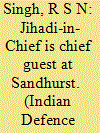

|
|
|
| 15 |
ID:
132467
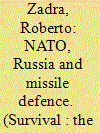

|
|
|
|
|
| Publication |
2014.
|
| Summary/Abstract |
Talks on NATO-Russia missile-defence cooperation were suspended in April during the crisis over Crimea. In retrospect, the window for a real breakthrough had closed some 18 months earlier.
After three and a half years of difficult discussions, the project exploring NATO-Russia missile-defence cooperation is not only suspended, but has probably reached its end. The initiative was an attempt to overcome Cold War thinking and realise the vision of the 2010 NATO-Russia Council Lisbon Summit: a 'true strategic and modernised partnership', and 'a common space of peace, security and stability in the Euro-Atlantic area'.
|
|
|
|
|
|
|
|
|
|
|
|
|
|
|
|
| 16 |
ID:
132421
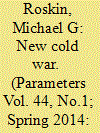

|
|
|
|
|
| Publication |
2014.
|
| Summary/Abstract |
Russian and Chinese hostility toward the United States
creates a New Cold War, but treating the two adversaries differently can make things break our way. US strategists should pick the bigger long-term threat, Russia or China, and treat it firmly and the smaller one flexibly, avoiding the rigid diplomatic and military policies that prolonged the old Cold War.
|
|
|
|
|
|
|
|
|
|
|
|
|
|
|
|
| 17 |
ID:
102902
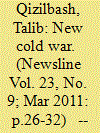

|
|
|
| 18 |
ID:
182253
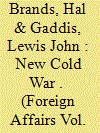

|
|
|
|
|
| Summary/Abstract |
Is the world entering a new cold
war? Our answer is yes and no. Yes
ifwe mean a protracted international rivalry, for cold wars in this sense
are as old as history itself. Some became
hot, some didn’t: no law guarantees
either outcome. No ifwe mean theCold
War, which we capitalize because it
originated and popularized the term.
That struggle took place at a particular
time (from 1945–47 to 1989–91), among
particular adversaries (the United
States, the Soviet Union, and their
respective allies), and over particular
issues (post–World War II power
balances, ideological clashes, arms
races). None ofthose issues looms as
large now, and where parallels do
exist—growing bipolarity, intensifying
polemics, sharpening distinctions
between autocracies and democracies—
the context is quite di+erent.
|
|
|
|
|
|
|
|
|
|
|
|
|
|
|
|
| 19 |
ID:
137496
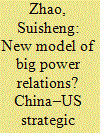

|
|
|
|
|
| Summary/Abstract |
Exploring the causes of the China–US strategic rivalry and its possible mitigation, this article argues that President Xi's new model of big power relations represents a challenge to the US primacy in the Asia–Pacific based on China's rising power and deeply rooted suspicion of the US containment. But neither the US nor China can be the single dominant power in the region. The new model can be built only if China and the US demonstrate a strategic restraint and maintain a delicate balance of power to prevent their rivalry from boiling over into a new Cold War.
|
|
|
|
|
|
|
|
|
|
|
|
|
|
|
|
| 20 |
ID:
115190
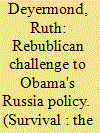

|
|
|
|
|
| Publication |
2012.
|
| Summary/Abstract |
In the two decades since the collapse of the Soviet Union, relations between the United States and Russia have oscillated between optimism and mutual suspicion. The second administration of George W. Bush (2005-09) is widely acknowledged as the lowest point in post-Cold War bilateral relations, with conflict over a range of prominent and sensitive issues such as missile defence, NATO enlargement, the practice and promotion of democracy, and the August 2008 Russia-Georgia War. In the last years of this period, the question of whether this represented the start of a 'new Cold War' was widely discussed.
|
|
|
|
|
|
|
|
|
|
|
|
|
|
|
|
|
|
|
|
|